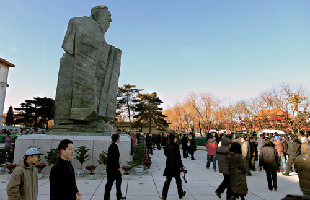
A bronze statue of Confucius has been unveiled near the Tian'anmen Square in central Beijing. [Photo: The Beijing News]
 |
|
A bronze statue of Confucius has been unveiled near the Tian'anmen Square in central Beijing. [Photo: The Beijing News] |
Confucius, of the Spring and Autumn Period (770 BC to 476 BC), guided people for thousands of years in many aspects of Chinese life, from raising children to ruling empires.
However, the reputation of the ancient scholar dropped sharply after Confucianism began to be seen as a symbol of outdated and backward feudal culture. Temples dedicated to the philosopher were torn down, and tombs of his descendants were destroyed.
Fifty-eight-year-old Kong Lingshao, a 76th-generation descendant of Confucius, had just finished primary school when the Cultural Revolution (1966-1976) started. He remembered how the Red Guards pulled down statues of Confucius from the temples and dragged them through the streets, and criticized the philosopher at public meetings.
"As a descendant, I don't have words to express the humiliation I felt," Kong Lingshao said.
However, he noted that, after several years, the Chinese nation had finally begun to reflect on how to treat its traditional culture.
"In Confucianism, there were flaws, but who is flawless?" Kong asked, adding that tolerance and seeking harmony without uniformity were important beliefs under Confucianism.
Confucius has been regaining popularity in recent years. In 2007, a female lecturer attracted nationwide attention with her televised lecture series about the Analects of Confucius.
Then, last September, the Nishan Forum on World Civilization was held in Qufu, where domestic and overseas scholars drew upon the wisdom of the ancient sages, Confucius and Jesus.
By the end of 2010, China had set up more than 320 Confucius Institutes in 96 countries around the globe.